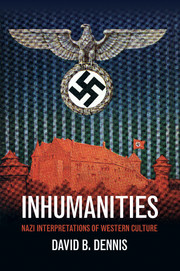Book contents
- Frontmatter
- Contents
- List of Illustrations
- Acknowledgments
- Introduction
- Part I Foundations of Nazi Cultural History
- Part II Blind to the Light
- Part III Modern Dilemmas
- Part IV “Holy” War and Weimar “Crisis”
- 13 Heralds of the Front Experience
- 14 Weimar Culture Wars 1
- 15 Weimar Culture Wars 2
- Part V Nazi “Solutions”
- Notes
- Index
14 - Weimar Culture Wars 1
Defending German Spirit from “Circumcision”
Published online by Cambridge University Press: 05 October 2012
- Frontmatter
- Contents
- List of Illustrations
- Acknowledgments
- Introduction
- Part I Foundations of Nazi Cultural History
- Part II Blind to the Light
- Part III Modern Dilemmas
- Part IV “Holy” War and Weimar “Crisis”
- 13 Heralds of the Front Experience
- 14 Weimar Culture Wars 1
- 15 Weimar Culture Wars 2
- Part V Nazi “Solutions”
- Notes
- Index
Summary
For all the energy directed at defining the merit and value of the cultural artifacts wrought from the German experience in the First World War, from the perspective of the Völkischer Beobachter, this conflict represented a mere skirmish in a larger clash between world views, and is most correctly seen as a continuation of the volkish reaction against modernity and modernist culture that had been going on since the second half of the nineteenth century. After the First World War, Hitler made it his personal task to give voice to those aggrieved by the cultural and technological encroachments of modernism on German life. As he put it: “theater, art, literature, cinema, press, posters, and window displays must be cleansed of all manifestations of our rotting world and placed in the service of a moral, political, and cultural idea. Public life must be freed from the stifling stench of our modern eroticism, just as it must be freed from all unmanly, prudish hypocrisy.” Aligned with this task, every word of Völkischer Beobachter cultural coverage was a shot fired in the Weimar culture wars. But it was more immediately an assault on the Republic itself – no matter what specific cultural forms were perceived as representing the era.
As we will see in Chapter 15, the paper’s onslaught against Weimar politics and culture involved intense assaults on the major representatives of contemporary literature, art, and music. But in its campaign to appropriate the high German tradition for Nazism, another objective was to convince readers that opposing views were not legitimate parts of this heritage. This chapter will concentrate on how the paper insinuated that great figures of the cultural past would have shared its critical attitudes toward conditions in post-First World War Germany in particular, and also how it attempted to show that German masters were being misunderstood or defamed by leftist or “Jewish” cultural authorities who supposedly controlled the culture of Weimar Germany. This will involve revisiting Völkischer Beobachter coverage of figures treated in Part I, which showed how it linked them with fundamental themes of the Nazi outlook. But this section will address the more immediate, contemporary associations contributors made between cultural heroes and the Weimar context, including the paper’s reporting on references to the “masters” at commemorations and rallies, whether organized by the NSDAP or other groups.
Information
- Type
- Chapter
- Information
- InhumanitiesNazi Interpretations of Western Culture, pp. 307 - 329Publisher: Cambridge University PressPrint publication year: 2012
